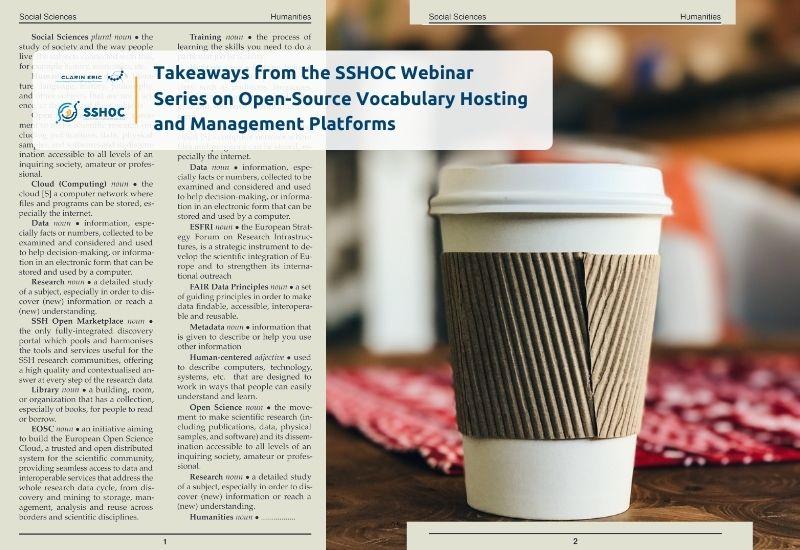
- Social Sciences & Humanities Open Cloud
Takeaways from the SSHOC Webinar Series on Open-Source Vocabulary Hosting and Management Platforms

Date:
30 October 2020
During September 2020, SSHOC project partner, CLARIN organised three separate virtual sessions where members of the SSH community could learn about and evaluate leading vocabulary management and publication platforms Wikibase, Skosmos, and the The CESSDA Vocabulary service.
Because the Social Science and Humanities sector is so broad and the research methods and work practices so diverse, the ways in which vocabularies are used to describe, discover, and access research content are many and varied. In line with the aim of the larger SSHOC project to create the conditions for sharing and optimising research data and services in a sustainable way across domains, the purpose of the sessions was to raise awareness of existing platforms with a view to selecting a single platform for storing and managing the SSHOC vocabulary registry.
In each session, a representative of the product development team provided a general overview of the platform. Thereafter, experts from different organisations presented concrete use cases and shared best implementation practices.
Main takeaways from the sessions
WIKIBASE
Wikibase is the underlying software for Wikidata, is ideal for structured data, and can be used for catalogs, authority files, and controlled vocabularies. Users can create and manage their knowledge base, form links between things and concepts, and share, collaborate, and reuse data, thus contributing to the Semantic Web. The data model is flexible, while the UI is based on rich JavaScript that enables users to easily access and update their data. If you’re curious about the future developments at Wikibase, take a look at their 2020 roadmap.
Image source: https://www.wikiba.se/images/wikibase-diagram.png
Use case
The use case presented by Barbara Fischer and Sarah Hartmann from the German National Library showed how Wikibase was tested for the Integrated Authority file project (GND) which is used by libraries to catalog publications. The main goal of the project was to make the free structured authority data of the libraries more easily accessible and interoperable. Their experience shows that while users with no programming skills can easily learn how to use the platform, data import/export can be tricky and requires expertise.
SKOSMOS
Skosmos is a vocabulary publication tool developed at the National Library of Finland (NLF), and provides centralised linked data vocabulary services nationally. It has an active user community. Organisations can use the platform to publish their vocabularies as linked open data, libraries for indexing, and vocabulary developers for vocabulary visualisation. While the platform provides advanced search and browsing options for vocabulary concepts, it does not provide a vocabulary editor.
Use case 1
Darren Bell from UK Data Service showed us how they implemented Skosmos with VocBench for the management of the ELSST multilingual thesaurus. The conclusion was that while Skosmos is very easy to deploy and supports real interoperability, VocBech requires knowledge of RDF and ontological practice. Both the Skosmos version of ELSST and an update of the HASSET thesauri will be published in November this year.
Image source: http://skosmos.dev.finto.fi/unesco/en/page/C00525
Use case 2
The second use case, presented by Matej Durco and Klaus Illmayer from ACDH-CH/OEAW, demonstrated the Skosmos workflows and editing options. After a thorough evaluation of several vocabulary platforms, ACDH-CH adopted Skosmos to manage their vocabularies due to the following advantages:
- Full SKOS support
- Well-structured and adaptable presentation layer keeps the code and data separate
- Well-maintained API and detailed documentation
However, the missing vocabulary editor poses some challenges when dealing with multiple users, conflicts, and versions. The ACDH-CH Vocab service is also used by DARIAH-EU.
CESSDA VOCABULARY SERVICE
The CESSDA Vocabulary service is a web application that enables users to discover, browse, and download vocabularies in a variety of languages. The service has a web editor as well as a browsing and download interface with an API on its way. The platform currently hosts 27 vocabularies created by CESSDA and DDI Alliance.
Image source: https://vocabularies.cessda.eu/#!discover
Taina Jääskeläinen from the Finnish Social Science Data Archive (FSD) explained how the service is used by archives to translate vocabularies included in the CESSDA metadata model so as to harmonise metadata across organizations. FSD has implemented a specific (semi-automatic) XML-based workflow to produce the English versions of their Finnish metadata descriptions.
Use case
Johan Fihn Marberg, from the Swedish National Data Service, highlighted that controlled vocabularies (CV) can be used to harmonise the metadata and increase its overall quality and findability. He further demonstrated how controlled vocabularies can be implemented in a metadata editor, and concluded that a vocabulary management tool should have multilingual capabilities (both on the level of term and description), and should offer a hierarchical structure and the option to add multilingual synonyms, as well as terms specific to a research domain within a broader controlled vocabulary.
It was also mentioned that the CESSDA Vocabulary Service API can be used to handle vocabulary versioning more efficiently.
What next?
The insights collected during these information sessions will be presented and discussed in more detail on 6 November in the virtual workshop SSHOC Considerations for Vocabulary platforms.
Did you miss a session?
You can access the slides and the recordings of the vocabulary information sessions via the following links:
To stay updated on SSHOC's latest activities, sign up for our newsletter, follow us on Twitter @SSHopenCloud or get in touch at info@sshopencloud.eu.
Photo by Ross Varrette on Unsplash
